Conversion词性转换
conversion词汇学定义解释
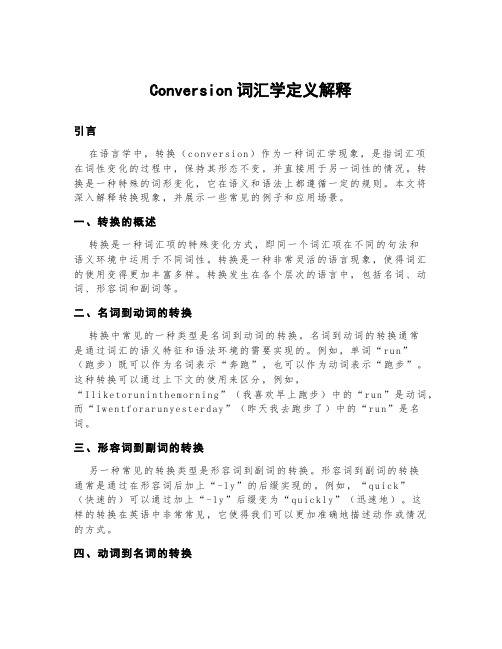
Conversion词汇学定义解释引言在语言学中,转换(c o nv er si on)作为一种词汇学现象,是指词汇项在词性变化的过程中,保持其形态不变,并直接用于另一词性的情况。
转换是一种特殊的词形变化,它在语义和语法上都遵循一定的规则。
本文将深入解释转换现象,并展示一些常见的例子和应用场景。
一、转换的概述转换是一种词汇项的特殊变化方式,即同一个词汇项在不同的句法和语义环境中运用于不同词性。
转换是一种非常灵活的语言现象,使得词汇的使用变得更加丰富多样。
转换发生在各个层次的语言中,包括名词、动词、形容词和副词等。
二、名词到动词的转换转换中常见的一种类型是名词到动词的转换。
名词到动词的转换通常是通过词汇的语义特征和语法环境的需要实现的。
例如,单词“r un”(跑步)既可以作为名词表示“奔跑”,也可以作为动词表示“跑步”。
这种转换可以通过上下文的使用来区分,例如,“I li ke to ru ni nt he m or ni ng”(我喜欢早上跑步)中的“r u n”是动词,而“Iw en tf or ar uny e st er da y”(昨天我去跑步了)中的“r u n”是名词。
三、形容词到副词的转换另一种常见的转换类型是形容词到副词的转换。
形容词到副词的转换通常是通过在形容词后加上“-l y”的后缀实现的。
例如,“q u ic k”(快速的)可以通过加上“-ly”后缀变为“qu ic kl y”(迅速地)。
这样的转换在英语中非常常见,它使得我们可以更加准确地描述动作或情况的方式。
四、动词到名词的转换除了名词到动词的转换外,动词到名词的转换也是一种常见的现象。
动词到名词的转换通常通过加上特定后缀实现,例如,“a rri v e”(到达)可以通过加上“-a l”后缀变为“a rr i va l”(到达)。
这种转换使得我们可以将动作或状态转化为一个名词,从而更好地描述或引用某种特定情况。
五、应用场景转换概念在日常语言中经常被使用,我们可以在各种语言环境和书面文本中找到转换的例子。
conversion转译法
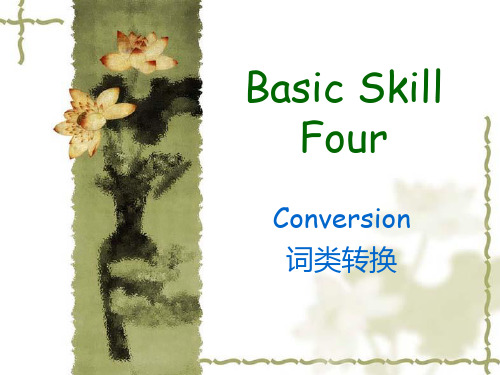
2. 形容词→名词 1) They did their best to help the sick and the wounded. 他们尽了最大的努力帮助病号和伤员 2) Stevenson was eloquent and elegant --- but a little soft 史蒂文森有口才,有风度,但有点软弱
3) The Kremlin is turning westward for capital and technology. 克里姆林宫正在转向西方寻求资金和技术
4) “Coming!”. Away she skipped over the lawn, up the patch, up the steps, across the veranda, and into the porth “来了”,她转身蹦蹦跳跳地离开了草地, 跑上了小路,跨上了台阶,穿过了阳台, 进了门廊
三、动词的转换
英语中有许多从名词派生而来或有名词转 用的动词, 它们大都难以直接译成汉语动词, 因而需要将其转换成名词后再译出, 同时往 往还需调整相关词语的词类和语序, 或适当 增词加以补充, 使译文更加完整, 通顺
1. He lunched me well at a restaurant yesterday. 他昨天请我在饭馆里吃了一顿像样的午餐
4. Such materials are characterized by good insulation and high resistance to wear.
这种材料的特点是绝缘性好并且耐磨性强
5. The design aims at automatic operation, easy regulation, simple maintenance and high productivity. 这项设计的目标是自动操作、调节简单、 维护简易、生产率高
Translation Techniques (1) Conversion, Amplification, Omission
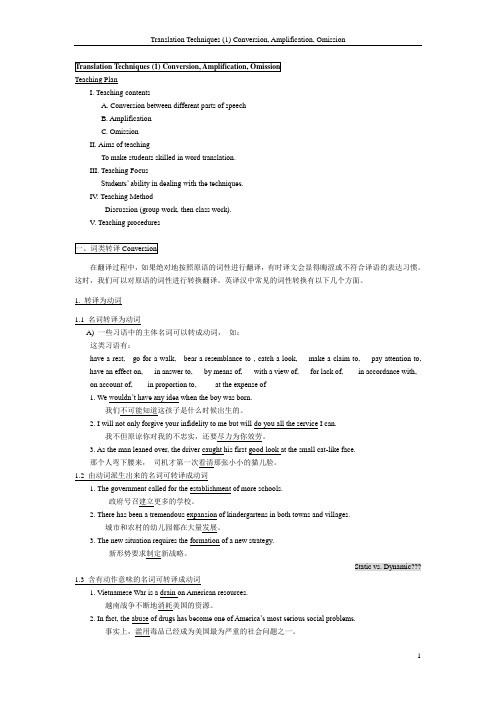
Teaching PlanI. Teaching contentsA. Conversion between different parts of speechB. AmplificationC. OmissionII. Aims of teachingTo make students skilled in word translation.III. Teaching FocusStudents’ ability in dealing with the techniques.IV. Teaching MethodDiscussion (group work, then class work).V. Teaching procedures在翻译过程中,如果绝对地按照原语的词性进行翻译,有时译文会显得晦涩或不符合译语的表达习惯。
这时,我们可以对原语的词性进行转换翻译。
英译汉中常见的词性转换有以下几个方面。
1. 转译为动词1.1 名词转译为动词A) 一些习语中的主体名词可以转成动词,如:这类习语有:have a rest, go for a walk, bear a resemblance to , catch a look, make a claim to, pay attention to, have an effect on, in answer to, by means of, with a view of, for lack of, in accordance with, on account of, in proportion to, at the expense of1. We wouldn’t have any idea when the boy was born.我们不可能知道这孩子是什么时候出生的。
2. I will not only forgive your infidelity to me but will do you all the service I can.我不但原谅你对我的不忠实,还要尽力为你效劳。
Conversion词的转换译法
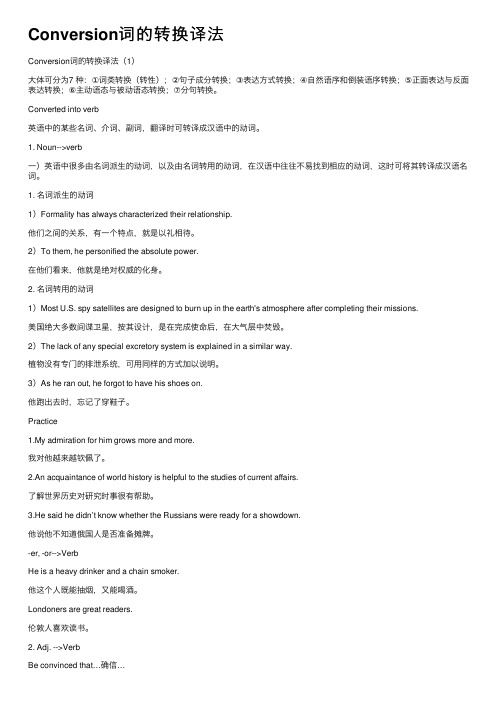
Conversion词的转换译法Conversion词的转换译法(1)⼤体可分为7 种:①词类转换(转性);②句⼦成分转换;③表达⽅式转换;④⾃然语序和倒装语序转换;⑤正⾯表达与反⾯表达转换;⑥主动语态与被动语态转换;⑦分句转换。
Converted into verb英语中的某些名词、介词、副词,翻译时可转译成汉语中的动词。
1. Noun-->verb⼀)英语中很多由名词派⽣的动词,以及由名词转⽤的动词,在汉语中往往不易找到相应的动词,这时可将其转译成汉语名词。
1. 名词派⽣的动词1)Formality has always characterized their relationship.他们之间的关系,有⼀个特点,就是以礼相待。
2)To them, he personified the absolute power.在他们看来,他就是绝对权威的化⾝。
2. 名词转⽤的动词1)Most U.S. spy satellites are designed to burn up in the earth's atmosphere after completing their missions.美国绝⼤多数间谍卫星,按其设计,是在完成使命后,在⼤⽓层中焚毁。
2)The lack of any special excretory system is explained in a similar way.植物没有专门的排泄系统,可⽤同样的⽅式加以说明。
3)As he ran out, he forgot to have his shoes on.他跑出去时,忘记了穿鞋⼦。
Practice1.My admiration for him grows more and more.我对他越来越钦佩了。
2.An acquaintance of world history is helpful to the studies of current affairs.了解世界历史对研究时事很有帮助。
Conversion词性转换

(2)when English verbs into Chinese nouns, the adv modify these verbs are frequently converted to adj. The film “Dance with wolves” impressed him deeply. <与狼共舞>这部电影给了他深刻的印象. The teacher had prepared discreetly for his lecture. 老师为他的讲座做了细致周密的准备.
Nominalization
• (1)Derivative verbs into C. nouns • Formality has always characterized their relationship. • 他们之间的关系,有一个特点,就是以礼相待。 • After the event, he would symbolize their frustrations. • 那次事件之后,他成了他们受挫的象征。 • To the soldiers, he personified the absolute power. • 在他们看来,他就是绝对权利的化身。
• (3) adjectives into C. nouns • They did their best to help the sick and the wounded. • 病号和伤员 • John was eloquent and elegant, but soft. • 有口才,有风度 • They were considered insincere. • 伪君子
• (2)Advs to Nouns • China’s entry into WTO is bound to promote the world economically and politically. • 中国加入世界贸易组织必将推动世界经济与政治 的发展. • He is physically weak but mentally sound. • 他身体虽弱,但思想健康. • They have not done so well ideologically, however, as organizationally. • 但是,他们的思想工作没有他们的组织工作做的 好.
词类转换法
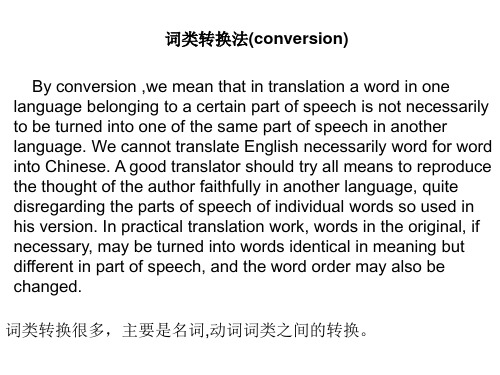
其他转换
adj—adv。He had a careful study of the map before he started off.// Can you give an accurate translation of the sentence. Noun—adv: He had the honour to attend the congress. The man nodded with satisfaction. Adv—noun: It was officially announced that they agreed on a reply to the Soviet Union. 官方宣布,他们就给苏联的复信取得了一致的意见。
而我们这些小国将会发现,资本主义就其本性而言,就是帝国主义,就 是剥削,我们小国会变成欧美资本主义国家和卫星国。
英语的名词和介词-----汉语的动词
由于汉语的动词使用频率大大高于英语,因此,在英汉翻译中,常把名 词、介词转换为动词。
1.The growing awareness by millions of Africans of their extremely poor and backward living conditions has prompted them to take resolute measures and create new ones.
Adj---noun:Official Cairo is taking pains to create impression as if its relations with East have remained untouched. 开罗官方千方百计想制造一种印象,好象它同东方国家的关系仍然没有受到影响。
Conversion转性译法
There are 3 types of English nouns which can be turned into Chinese verbs in translation
A. Nouns derived from verbs: construction, application, appearance, etc.
1). 一切爱好和平的人民都要求全面禁止核武器, 彻底销毁核武器。
All peace-loving people demand the complete prohibition and thorough destruction of nuclear weapons.
2). The government called for the establishment of more technical schools. 政府号召建立更多的技术学校。
B. Nouns denoting actions: sight, thought, mention, etc.
1). A glance through my office window offers a panoramic view of the garden outside. 从我办公室的窗口往外看,窗外的花园可以一览遗 (尽收眼底)。
2). The sight of these pictures reminded him of the good old days spent on the campus. 一看到这些照片他就想起在校园内度过的美好时光。
C. Nouns formed by adding suffixes: er/or, visitor, actor, forgiver, etc.
9). A socially mature person gets along well with all types of people in all types of situations. He does not necessarily like or respect all people, but he is tolerant and understanding and does not intentionally hurt anyone’s feelings. 在社交方面成熟的人能在各个场合之下,与 三教九流的人相处得很好。他不一定要喜欢或
汉英翻译技巧之词类转换法_Conversion
汉英翻译技巧之词类转换法Conversion▪Conversion: Conversion is also a common practice in Chinese-English translation. It is to change the part of speech into another.▪Verbs to be converted into Nouns.▪1) 林则徐认为,要成功地制止鸦片买卖,就得首先把鸦片销毁。
▪Lin Zexu believed that a successful of the trade in opium should be preceded by a of the drug itself.▪2) 邓小平在“十一大”上说:“一定要少说空话,多做工作”。
▪Deng Xiaoping said at the 11th Party Congress,“There must be and .” (v.--n.)▪3) 绝对不许违反这个原则。
▪No of this principle can be tolerated. (v.—n.)▪4)采用这种新装置可以大大降低废品率。
▪The of this new device will greatly cut down/reduce the percentage of defective products.▪5) 他在讲话中特别强调提高产品质量。
▪He raising the quality of products in his speech.▪6) 中国人民百年以来不屈不挠、再接再厉地英勇斗争,使得帝国主义至今不能灭亡中国,也永远不能灭亡中国。
▪Thanks to the Chinese people’s unrelenting and heroic during the last hundred years, imperialism has not been able to conquer/subjugate/disintegrate China, nor will it ever be able to do so.▪7) 他们一不会做工,二不会种地,三不会打仗。
Conversion转性译法
6). Britain has no such natural protection from a flood of Hollywood products. 英国没有这种天然的保护来阻挡好莱坞影片长驱直 入。
1.Conversion to Chinese Verbs (转化为汉语动词)
(1). N. Converted into V.(名—动)
Nouns and noun forms, especially action nouns and other abstract nouns, find their wider use in forms are much preferred in Chinese.
转性译法—在翻译过程中,在保证原文意义不变的
前提下,根据语言的习惯进行词性转换,以确保 译文通顺流畅。
2. Types of Conversion
1). Parts of speech 2). Sentence elements
A. Conversion in E-C Translation I. Conversion of parts of speech 词类转换
1). His very appearance at any affair proclaims it a triumph.
任何事情,他只要露面,就可大功告成。
2). Rockets have found wide application for the exploration of the universe. 火箭已经广泛用于探索宇宙
Unit 4 Conversion 词类转换
3) Adjectives Converted into Verbs Many English adjectives after a link verb indicating one’s consciousness, feelings, emotions, desires, etc. are always converted into Chinese verbs. These words include:confident,certain,careful, cautious,angry,sure,ignorant,afraid,doubtful,aware, concerned,glad,delighted,sorry,ashamed,thankful,anxious, grateful,able,etc. ·Doctors have said that they are not sure they can save his life. 医生说他们不敢肯定 肯定能否救得了他的命。 肯定 ·The fact that she was able to send a message was a hint. But I had to be cautious. 她能够 能够给我带个信儿这件事就是个暗示。但是我必须小心谨慎 小心谨慎。 能够 小心谨慎 ·Both of the substances are soluble in water. 两种物质都能溶于水。 溶
4.1.4 .Converting into Adverbs 各种词类转换成副词
1)Adjectives Converted into Adverbs This is the most common case when a noun modified by an adjective is converted into a verb in the Chinese version.Sometimes,it is just for the sake of convenience. • Below 4℃.,water is in continuous expansion instead of continuous contraction. 水在4摄氏度以下就不断地膨胀,而不是不断地收缩。 • Only when we study their properties can we make better use of the materials. 只有研究这些材料的特性才能更好地利用它们。 • Helicopter is free to go almost anywhere. 直升飞机几乎可以自由地飞到 任何地方去。
- 1、下载文档前请自行甄别文档内容的完整性,平台不提供额外的编辑、内容补充、找答案等附加服务。
- 2、"仅部分预览"的文档,不可在线预览部分如存在完整性等问题,可反馈申请退款(可完整预览的文档不适用该条件!)。
- 3、如文档侵犯您的权益,请联系客服反馈,我们会尽快为您处理(人工客服工作时间:9:00-18:30)。
• (3)adj and adv into verbs • See previous parts • Confident, certain, careful, cautious, angry, sure, ignorant, afraid, doubtful, aware, concerned, glad, delighted, sorry, ashamed, thankful, anxious, grateful, able…
Converted to Adjectives
• (1) Eng. Nouns(derive from adj.) to Chin. Adj. • The security and warmth of your house impressed me very much. • 你的家很安全也很温暖,让我印象深刻. • His sharp questions revealed the enormity of his doubts on the event . • 他尖锐的问题表明他对事件的真相有很大 的怀疑.
Conversion
词性转换
Verbቤተ መጻሕፍቲ ባይዱlization
• 1. E. nouns into C.verbs • One after another, speakers called for the downfall of imperialism, abolition of exploitation of man by man, liberation of the oppressed of the world. • 打倒,消灭,解放 • The sight and sound of our jet planes filled me with special longing. • Heavy footsteps signaled the teacher’s approach. • Teacher, forgiver….
• (2)converted verbs into C. nouns • The landing was designed to cut the region in two. • 目的 • The navy was positioned to safeguard the Pacific Ocean. • 阵势
(2)when English verbs into Chinese nouns, the adv modify these verbs are frequently converted to adj. The film “Dance with wolves” impressed him deeply. <与狼共舞>这部电影给了他深刻的印象. The teacher had prepared discreetly for his lecture. 老师为他的讲座做了细致周密的准备.
• (3) adjectives into C. nouns • They did their best to help the sick and the wounded. • 病号和伤员 • John was eloquent and elegant, but soft. • 有口才,有风度 • They were considered insincere. • 伪君子
Other Types
1. adj vs adv • (1)when English nouns into Chinese verbs, the adj. modifies the nouns are frequently converted into adv. • The little girl turned apprehensive glances toward the forest at times. • 小女孩不时忧虑地朝森林看去. • We took brief, restless naps, struggled to understand the intermittent broadcasting. • 我们短短地、不安地睡了几次,竭力想听懂断断续续的广 播。 • It was a clear exposition of the President’s reasons for willing to improve Sino-U.S relationship. • 这篇发言清楚地说明了总统希望改善中美关系的原因。
Nominalization
• (1)Derivative verbs into C. nouns • Formality has always characterized their relationship. • 他们之间的关系,有一个特点,就是以礼相待。 • After the event, he would symbolize their frustrations. • 那次事件之后,他成了他们受挫的象征。 • To the soldiers, he personified the absolute power. • 在他们看来,他就是绝对权利的化身。
• (2)Advs to Nouns • China’s entry into WTO is bound to promote the world economically and politically. • 中国加入世界贸易组织必将推动世界经济与政治 的发展. • He is physically weak but mentally sound. • 他身体虽弱,但思想健康. • They have not done so well ideologically, however, as organizationally. • 但是,他们的思想工作没有他们的组织工作做的 好.
• • • • • •
(3)English adj. into Chinnese adv. This is sheer nonsense. 这完全是胡说. Tom was in a clear manority. 汤姆显然属于少数. If you dial the wrong number once, you will miss the chance forever. • 只要你拨错一次号码,就将永远失去机会.
• 2.Noun vs Adv. • (1)Nouns into Advs. • When he catches a glimpse of a potential antagonist, his instinct is to win him over with charm and humor. • 只要一发现有可能反对他的人,他就本能地要用他的魅力 和风趣将这个人争取过来. • Now we begin to meet with a series of disasters, the substance of which is an attack from our opponents. • 现在我们开始遭受一连串的灾难,这些灾难实质上就是敌 人对我们的攻击.
• (2) Eng. predicatives without definite articles to Chin. Adj. • The conference was a success. • 会议很成功. • As he is a total stranger in the city, I hope you will give him necessary help. • 他对这座城市完全陌生,我希望你能给他必要的帮 助. • Independent thinking is an absolute necessity in study. • 独立思考对学习是绝对必需的.
• (2)prep. into C. verbs • Party officials worked long hours on meagre food, in cold caves, by dim lamps. • 党的干部吃简陋的食物,住寒冷的窑洞,靠微弱 的灯光,长时间的工作。 • “Coming!” Away she skimmed over the lawn, up the path, across the veranda, and into the porch.
